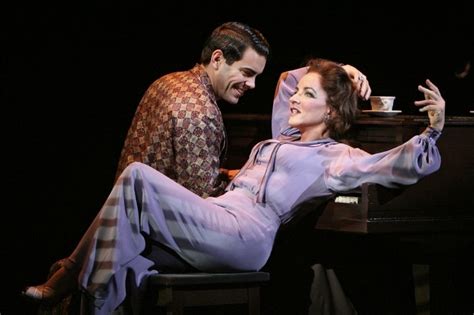Introduction
Mezzo sopranos possess unique vocal abilities that lend themselves perfectly to the demands of musical theatre. Their voices seamlessly navigate both soaring heights and sultry depths, making them ideal for complex and captivating roles. This comprehensive guide explores the mezzo soprano’s repertoire in musical theatre, providing an in-depth analysis of iconic songs and tips for aspiring performers.

Iconic Mezzo Soprano Musical Theatre Songs
“Don’t Cry for Me Argentina” (Evita)
This heart-wrenching anthem of longing and sacrifice has become synonymous with the role of Eva Perón. Andrew Lloyd Webber’s soaring melody and Tim Rice’s poignant lyrics paint a vivid portrait of Evita’s unyielding spirit and the complexities of her character.
“I Dreamed a Dream” (Les Misérables)
Fantine’s haunting soliloquy is a tour de force for mezzo sopranos. Its soaring melody and emotionally charged lyrics convey the character’s heartbreak, vulnerability, and resilience. It has become an enduring classic that continues to move audiences worldwide.
“Defying Gravity” (Wicked)
Elphaba’s showstopping number is a powerful anthem of self-acceptance. Stephen Schwartz’s electrifying music and lyrics challenge the status quo and celebrate the indomitable spirit of an outcast. Its soaring melody and epic arrangement have made it a beloved favorite among mezzo sopranos.
“Somewhere” (West Side Story)
Maria’s timeless ballad is a poignant expression of hope and longing. Leonard Bernstein’s lush melodies and Stephen Sondheim’s evocative lyrics create an unforgettable moment of longing and anticipation. It remains one of the most beloved and enduring songs in musical theatre history.
“Climb Ev’ry Mountain” (The Sound of Music)
Mother Abbess’s inspirational anthem is a powerful declaration of perseverance. Richard Rodgers’ soaring melody and Oscar Hammerstein II’s heartwarming lyrics encourage listeners to embrace life’s challenges and never give up. It has become a timeless classic that continues to inspire mezzo sopranos and audiences alike.
Tips for Aspiring Mezzo Sopranos
- Develop a strong vocal technique: Focus on building a solid foundation in breath control, vocal projection, and vocal agility.
- Study the repertoire: Immerse yourself in the musical theatre canon, paying close attention to the vocal demands of mezzo soprano roles.
- Seek out coaching and training: Engage with experienced voice teachers and coaches who can provide guidance and support.
- Attend workshops and masterclasses: Participate in opportunities to refine your skills, learn from experts, and network with other performers.
- Practice regularly: Dedicate consistent time to practicing your singing, focusing on both vocal exercises and repertoire pieces.
Common Mistakes to Avoid
- Forcing the voice: Avoid pushing your voice beyond its natural limits. Focus on maintaining a healthy vocal technique and developing a strong range.
- Neglecting breath control: Proper breath control is essential for maintaining vocal stamina and seamless transitions.
- Over-emoting: While emotional expression is important, avoid overwhelming your singing with excessive theatrics.
- Neglecting diction: Clear and articulate diction is crucial for conveying the text and connecting with the audience.
- Ignoring the context: Study the character you are portraying and understand the context of the song to deliver a nuanced and believable performance.
Frequently Asked Questions (FAQs)
Q1: What is the typical vocal range of a mezzo soprano?
A1: Mezzo sopranos typically have a vocal range that extends from the low A below middle C (A3) to the high G above middle C (G5).
Q2: How can I improve my vocal stamina as a mezzo soprano?
A2: Regular vocal exercises, proper breath control, and maintaining a healthy vocal technique are essential for building vocal stamina.
Q3: What are some good vocal exercises for mezzo sopranos?
A3: Exercises such as lip trills, tongue trills, and scales help develop vocal agility and strengthen the vocal cords.
Q4: How can I find opportunities to perform as a mezzo soprano?
A4: Attend auditions, join local musical theatre companies, and participate in community theatre productions to gain experience and build your portfolio.
Q5: What are some other notable mezzo soprano musical theatre roles?
A5: Meg Giry (The Phantom of the Opera), Mrs. Lovett (Sweeney Todd), Nancy (Oliver!), and Marian Paroo (The Music Man).
Q6: How can I prepare for an audition as a mezzo soprano?
A6: Prepare your repertoire thoroughly, choose songs that showcase your strengths, and work with a vocal coach to refine your performance.
Q7: What are some tips for performing high notes as a mezzo soprano?
A7: Use proper breath support, focus on maintaining a relaxed vocal tract, and avoid straining your voice.
Q8: How can I find a reputable vocal coach for mezzo sopranos?
A8: Seek recommendations from experienced performers, attend workshops, and research online for qualified vocal teachers specializing in working with mezzo sopranos.
Conclusion
Mezzo soprano musical theatre songs offer a rich and diverse landscape of vocal possibilities. By embracing their unique vocal abilities and developing a strong technical foundation, aspiring mezzo sopranos can deliver compelling and unforgettable performances. This guide provides a comprehensive overview of iconic songs, tips for success, and common pitfalls to avoid. Embrace the challenges and rewards of this captivating vocal fach and embark on a fulfilling musical journey.
